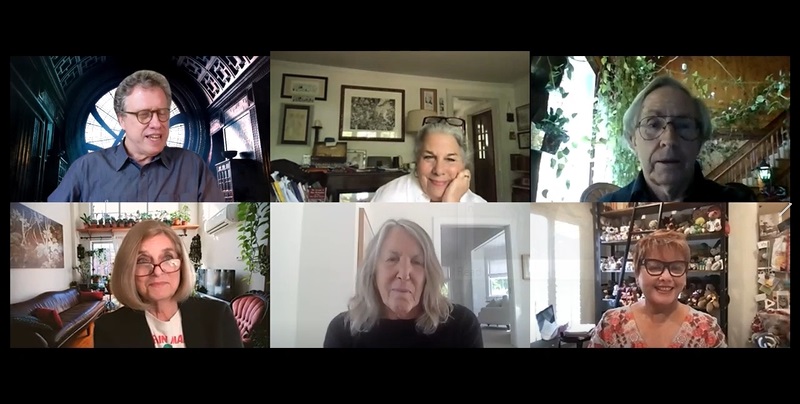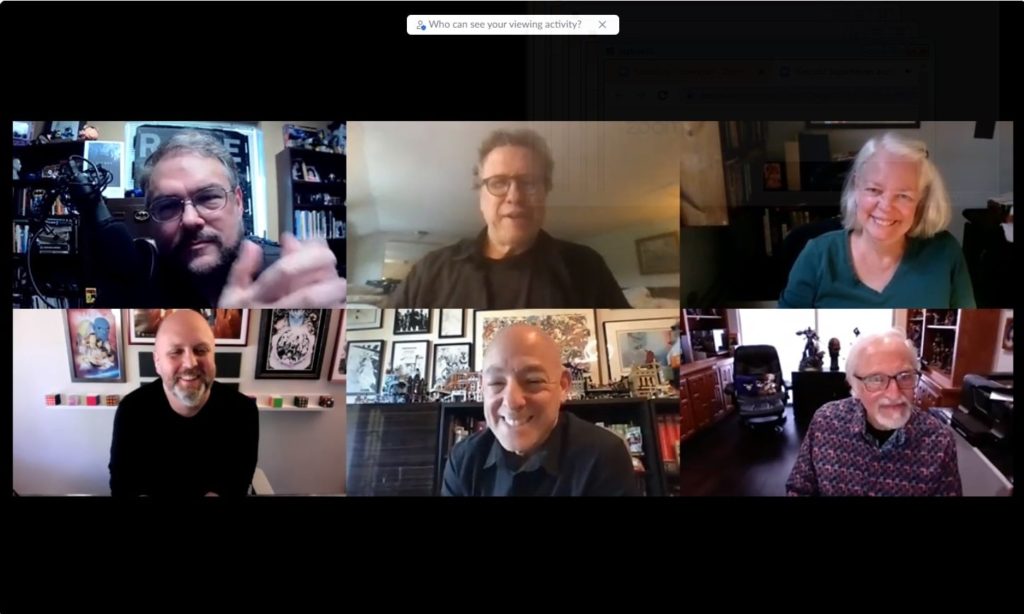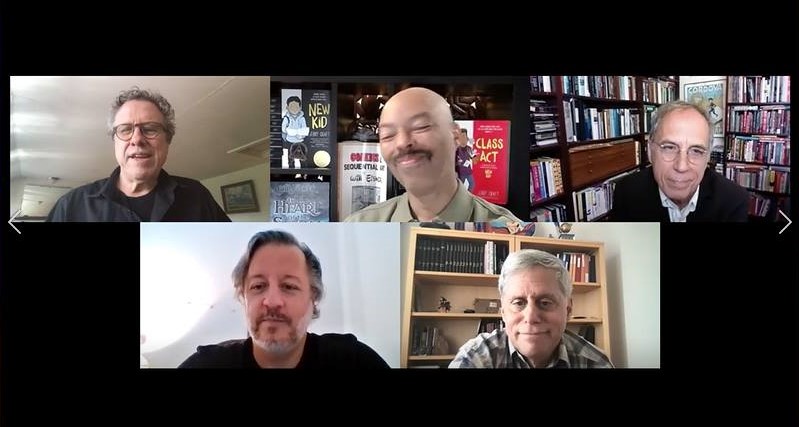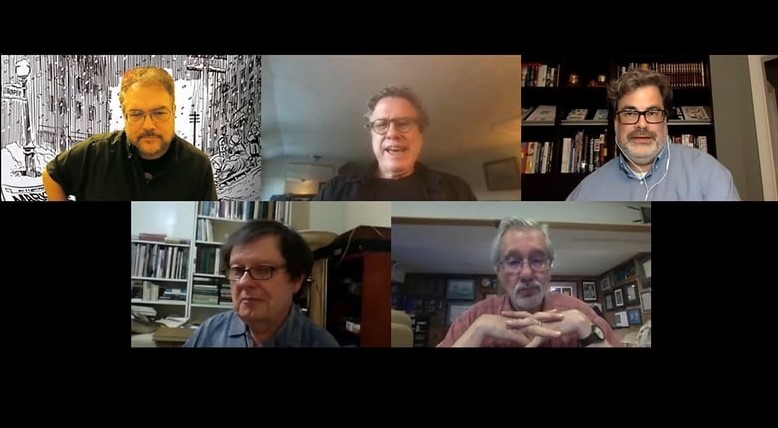WandaVision Breakdown: The Scarlet Witch and Vision Disassembled
Dr. Colt Blunt, PsyD, LP, forensic psychologist, has worked as a forensic examiner throughout his career and serves as a guest lecturer and trainer for organizations and educational institutions. He directs a postdoctoral fellowship for aspiring forensic psychologists. He has written for THE WALKING DEAD PSYCHOLOGY: PSYCH OF THE LIVING DEAD, STAR WARS PSYCHOLOGY: DARK SIDE OF THE MIND, GAME OF THRONES PSYCHOLOGY: THE MIND IS DARK AND FULL OF TERRORS, STAR TREK PSYCHOLOGY: THE MENTAL FRONTIER, SUPERNATURAL PSYCHOLOGY: ROADS LESS TRAVELED, DAREDEVIL PSYCHOLOGY: THE DEVIL YOU KNOW, and THE JOKER PSYCHOLOGY: EVIL CLOWNS AND THE WOMEN WHO LOVE THEM.
Twitter: @DrBlunt4
Dr. Scott Jordan, PhD, cognitive psychologist, studies the roots of cooperative behavior. He often uses popular culture in his classes to illustrate the relevance of psychology to daily life. He has contributed to Popular Culture Psychology books on Captain America, Iron Man, Black Panther, Daredevil Wonder Woman, Star Trek, Westworld, and the Joker. He is extremely proud of his international comic book collection. Through the Dark Loops Productions podcast, he shares scholarly conversations about life, science, and all things pop culture.
Twitter: @Dark_Loops
YouTube: Dark Loops Productions
Justine Mastin, MA, LMFT, LADC (Blue Box Therapy in Minneapolis), works with clients who self-identify as being outside the mainstream, such as geek, secular, and LGBTQIA. Justine is the fearless leader of YogaQuest, an organization that blends geek narratives with yoga. At popular culture conventions, she teaches yoga and speaks on geek wellness topics. Having previously contributed chapters to the Popular Culture Psychology books on Supernatural, Daredevil, Westworld, and the Joker, she co-authored the podcast-based book STARSHIP THERAPISE: USING THERAPEUTIC FAN FICTION TO REWRITE YOUR LIFE.
Twitter/Instagram/Facebook: @MindBodyFandom
Brittani Oliver Sillas Navaro, MA, AMFT, grief counselor, obtained her master’s degree in family therapy at the University of Houston-Clear Lake. Currently, she is completing her PsyD in couples and family therapy at Alliant International University while conducting counseling via remote during lockdown. She has presented in the USA and abroad on topics including grief and loss, as well as sexual and cultural influences on bereavement research. Her writing includes contributions for grief and loss in the black and LatinX communities, along with a chapter in BLACK PANTHER PSYCHOLOGY: HIDDEN KINGDOMS.
Instagram: @BeeTherapeutic
Dr. Billy San Juan, PsyD, clinical psychologist, has written for many of the Popular Culture Psychology books. He has written fiction for various publications such as CALIFORNIA SCREAMIN’ and OUT OF YOUR SHADOW: AN EMPOWERED SIDEKICKS ANTHOLOGY, and contributed text to the Magic: The Gathering game. He has spoken on panels at various conventions and moderated celebrity Q&A sessions for Wizard World.
Twitter: @Billi_sense
Jenna Busch, entertainment journalist for SyFy, founded the Legion of Leia, now at VitalThrills,com. She co-hosted “Cocktails with Stan” on YouTube with the legendary Stan Lee and hosted “Most Craved.” Busch has co-authored chapters and features in 11 of the 12 books in the Popular Culture Psychology series.
Twitter/Instagram: @JennaBusch
WandaVision Breakdown II: The Scarlet Witch and Vision Re-assembled!
Dr. Jim Davies (jimdavies.org) is a professor at the Department of Cognitive Science at Carleton University where he is director of the science of imagination laboratory. He is the author of BEING THE PERSON YOUR DOG THINKS YOU ARE: The Science of a Better You, IMAGINATION: The Science of Your Mind’s Greatest Power and RIVETED: The Science of Why Jokes Make us Laugh, Movies Make us Cry, and Religion Makes us Feel One with the Universe. He is co-host of the award winning podcast Minding the Brain. He has contributed chapters to STAR WARS PSYCHOLOGY: DARK SIDE OF THE MIND, DOCTOR WHO PSYCHOLOGY: A MADMAN WITH A BOX, STAR TREK PSYCHOLOGY: THE MENTAL FRONTIER, DAREDEVIL: THE DEVIL YOU KNOW, and WESTWORLD PSYCHOLOGY: VIOLENT DELIGHTS. In his spare time, he is a published poet and fiction writer, an internationally-produced playwright, and a professional artist and calligrapher. His sister is novelist J.D. Spero.
Facebook: AuthorJimDavies
Twitter: @DrJimDavies
Author photo credit: Daniel Thompson Photography.’
Alex Langley, MS, who allegedly can control gravity and swim at over 800 mps, has a dangerous, borderline nuclear passion for writing. He most recently authored MAKE A NERDY LIVING (Sterling Publications) and previously THE GEEK HANDBOOK, THE GEEK HANDBOOK 2.0, GEEK LUST, and 100 GREATEST GRAPHIC NOVELS (Krause Publications). He contributed to STAR WARS PSYCHOLOGY: DARK SIDE OF THE MIND and CAPTAIN AMERICA VS. IRON MAN: FREEDOM, SECURITY PSYCHOLOGY. He is the writer/creator of the YA graphic novel KILL THE FRESHMAN. Online, he he written about retro and modern gaming for Arcade Sushi, edited content for geek girl/web celeb @ActionChick Katrina Hill at actionflickchick.om, has been editor of NerdSpan’s gaming section, and co-created the webseries Geeks and Gamers Anonymous. He has spoken on panels at fan convention including WonderCon, San Diego Comic-Con International, and numerous Wizard World conventions. His published works also include academic papers, and he likes your hair like that.
Twitter, Facebook: @RocketLlama
Dr. Janina Scarlet, PhD, licensed clinical psychologist, is an author, TEDx speaker, and full-time geek. A Ukrainian-born refugee, she survived Chernobyl radiation and persecution. She immigrated to the United States at the age of 12 with her family and later, inspired by the X-Men, developed Superhero Therapy to help patients with anxiety, depression, and PTSD. Dr. Scarlet is the recipient of the Eleanor Roosevelt Human Rights Award by the United Nations Association for her work on Superhero Therapy. Her work has been featured on Yahoo, BBC, NPR, Sunday Times, CNN, CW, ABC, The New York Times, Forbes, and many other outlets. She was also portrayed as a comic book character in Gail Simone’s Seven Days graphic novel. Dr. Scarlet currently works at the Center for Stress and Anxiety Management in San Diego. She authored SUPERHERO THERAPY, HARRY POTTER THERAPY, THERAPY QUEST, DARK AGENTS, SUPER-WOMEN, SUPERNATURAL THERAPY, SUPER-SURVIVORS, as well as numerous contributions to STAR WARS PSYCHOLOGY, STAR TREK PSYCHOLOGY, WONDER WOMAN PSYCHOLOGY, SUPERNATURAL PSYCHOLOGY, and many other books.
Twitter: @ShadowQuill
Instagram: @DrJaninaScarletOfficial
Facebook: Shadow.Scarletl
Dr. Yoni Sobin, PsyD, “The Nerd Therapist,” is a clinical psychologist in private practice who specializes in treating OCD and anxiety disorders, using cognitive-behavioral therapy and acceptance and commitment therapy approaches. He loves incorporating pop culture directly into the course of a patient’s treatment and using fandom to help patients live their best life. In his spare time, he enjoys Lord of the Rings on repeat, reading graphic novels, and building Lego. Sometimes he tries to move metal with his mind and fails. Yoni finds joy in (over)analyzing the psychological makeup of fictional characters. Yoni has contributed to THE JOKER PSYCHOLOGY: EVIL CLOWNS AND THE WOMEN WHO LOVE THEM and joined many Wizard World panels prior to the current pre-apocalyptic shutdown.
Facebook: @NerdPsychology
Instagram: @nerd_therapist
Dr. Tracy Vozar, clinical psychologist, specializes in working with caregivers and their young children. She directs a Perinatal to Five Mental Health specialty and clinic through her role as a faculty member at the University of Denver. She weaves her love for attachment theory and relationship-based work into her love for pop culture and sometimes makes some sense of it all. Dr. Vozar co-authored “The Raising of a King: Father-Son Attachment between T’Chaka and T’Challa” for the Popular Culture Psychology book BLACK PANTHER PSYCHOLOGY: HIDDEN KINGDOMS.
Twitter: @TracyVozar
Facebook, Instagram: Vozar Krewe
The Falcon and the Winter Soldier Breakdown: Sidekicks’ Ascent or Buddy Cop Bromance?
Dr. Travis Langley, PhD, Distinguished Professor of Psychology at Henderson State University, is best-known as the author of the acclaimed book BATMAN AND PSYCHOLOGY: A DARK AND STORMY KNIGHT. He is also editor and lead writer for the Popular Culture Psychology series of 12 books looking at the psychology of characters and stories such as THE WALKING DEAD PSYCHOLOGY: PSYCH OF THE LIVING DEAD, CAPTAIN AMERICA VS. IRON MAN: FREEDOM, SECURITY, PSYCHOLOGY, and most recently THE JOKER PSYCHOLOGY: EVIL CLOWNS AND THE WOMEN WHO LOVE THEM. PsychologyToday.com features his blog, “Beyond Heroes and Villains.” A popular speaker internationally, he has given talks at universities and has led or joined hundreds of convention panels (especially at Wizard World shows) and on the Comic Con-Fusion YouTube channel. He also happened to be an undefeated champion on the Wheel of Fortune game show. As Stan Lee described him, “This man is a genius!”
Twitter: @Superherologist
Facebook/Instagram: @DrTravisLangley
YouTube: Comic Con-Fusion
Travis Adams, MSW, received his graduate degree from the University of Southern California and is currently a readjustment counselor working with service members and their families at the San Diego Vet Center. He is a Marine Corps veteran who specializes in aiding service members who have been diagnosed with mental health diagnosis stemming from military service. He utilizes various types of therapy to aid veterans in their recovery and has incorporated the use of Pop Culture in conjunction of standardized treatment models. He has co-authored multiple chapters in the Popular Culture Psychology series, including the books SUPERNATURAL PSYCHOLOGY, DAREDEVIL PSYCHOLOGY, WESTWORLD PSYCHOLOGY, and BLACK PANTHER PSYCHOLOGY.
Twitter: @themarine_peer
Dr. Asher Johnson, PhD, completed his doctorate in clinical psychology, emphasizing forensics and crime. He has spoke on various geek psychology panels at fan conventions to discuss his application of superhero redemption therapy to inmates and parolees. He spent two years providing mental health services to state prisoners and three years working with federal and county probationers. He contributed to works such as THE JOKER PSYCHOLOGY: EVIL CLOWNS AND THE WOMEN WHO LOVE THEM.
Justine Mastin, MA, LMFT, LADC (Blue Box Therapy in Minneapolis), works with clients who self-identify as being outside the mainstream, such as geek, secular, and LGBTQIA. Justine is the fearless leader of YogaQuest, an organization that blends geek narratives with yoga. At popular culture conventions, she teaches yoga and speaks on geek wellness topics. Having previously contributed chapters to the Popular Culture Psychology books on Supernatural, Daredevil, Westworld, and the Joker, she co-authored the podcast-based book STARSHIP THERAPISE: USING THERAPEUTIC FAN FICTION TO REWRITE YOUR LIFE.
Twitter/Instagram/Facebook: @MindBodyFandom
Brittani Oliver Sillas Navaro, MA, AMFT, grief counselor, obtained her master’s degree in family therapy at the University of Houston-Clear Lake. Currently, she is completing her PsyD in couples and family therapy at Alliant International University while conducting counseling via remote during lockdown. She has presented in the USA and abroad on topics including grief and loss, as well as sexual and cultural influences on bereavement research. Her writing includes contributions for grief and loss in the black and LatinX communities, along with a chapter in BLACK PANTHER PSYCHOLOGY: HIDDEN KINGDOMS.
Instagram: @BeeTherapeutic
Dr. Billy San Juan, PsyD, clinical psychologist, has written for many of the Popular Culture Psychology books. He has written fiction for various publications such as CALIFORNIA SCREAMIN’ and OUT OF YOUR SHADOW: AN EMPOWERED SIDEKICKS ANTHOLOGY, and contributed text to the Magic: The Gathering game. He has spoken on panels at various conventions and moderated celebrity Q&A sessions for Wizard World.
Twitter: @Billi_sense
Dr. Eric Wesselmann, PhD, social psychologist, studies the dynamics of social inclusion and exclusion in daily life. He has taught several classes connecting psychology to topics such as popular films, fandom, and both the Batman and X-Men media franchises. He has contributed chapters to eight volumes of the Popular Culture Psychology series (e.g., The Joker Psychology, Wonder Woman Psychology). Eric regularly discusses the overlap between psychology and popular culture topics at conventions both local and national. He has contributed to several podcasts for WGLT Psych Geeks and writes essays on psychology and cult films called FilmCULTure.
Twitter: @EricWesselmann
Snyder vs. Whedon vs. YOU: Justice League, Avengers, Buffy, and Beyond
Sam Carrico is a photojournalist by day and YouTube movie critic by night. His work has been featured on FOX23 News in Tulsa, HeroGoHome.com, and even CNN if you count the time they happened to be shooting a story at his elementary school. You can currently find Sam hosting THE FILM FANCLUB SHOW Mondays on YouTube.
Twitter/Instagram: @samueldcarrico
YouTube: TheFilmFanclub
Alex Langley
Dr. Billy San Juan
Lenny Schwartz is an award-winning playwright and screenwriter, and also a writer of a biographical graphic novel with the recent release of Chazan Unfiltered. Lenny runs his own theatre company, Daydream Theatre Company, where he writes and directs original and biographical plays. He writes and produces films with Scorpio Films Releasing and IM Filmworks. He has written plays about comic book artist Steve Ditko, psychiatrist Fredric Wertham, cartoonist Charles Schulz, actor Buster Keaton, and the Marx Brothers. He is currently working on a rewrite of a biographical play he wrote about Batman co-creator Bill Finger. He lives in North Scituate, RI.
Twitter: @LennySchwartz
Facebook: leonard.x.schwartz
Superman Breakdown: From Krypton to the Snyder Cut, Superman & Lois, Homelander, and Beyond
Dr. Harpreet Malla, clinical psychologist, identifies as a 1.5 generation Indian-American feminist and enjoys navigating the cultural nuances those experiences have brought her. Dr. Malla has a passion for working with identity development as it pertains to LGBTQ, bicultural, and adolescent/young adult populations and recently has seen a rise in couples navigating arranged or other nontraditional marital practices in her work, including interracial/interfaith couples and those in poly constellations. Dr. Malla is the Diversity Chair for the Los Angeles County Psychological Association, is currently authoring a book chapter, and has spoken as an educator at several universities and conferences. In her spare time, she enjoys delighting in the MCU & DCEU, analyzing narratives and infusing popular psychology in pop culture, making soap, traveling, and trying new foods.
Email: harpreet.malla@shantioc.org
Dr. Angela Petersen, PhD, is a licensed clinical psychologist and specialist in areas of combined mental health and substance use disorders. She has a private practice as a therapist and a consultant offering supervision, training, and program development. She also currently acts as Clinical Director for a community based mental health clinic system in Western Montana. Dr. Petersen has tremendous respect for the art of storytelling in all modalities and the ability of a well told story to help individual understand their own life, and experiences. She has used lessons from stories told in books, comics, and film to translate the principles of evidence based practices in individual and group therapies. After spending some years working directly with Veteran populations, she learned to relate stories out of superhero literature to help explain and de-stigmatize aspects of depression, PTSD, addiction. She has previously participated in panels at the LA Comic-Con and hopes to continue with others moving forward.
Twitter: @dr_squirrelgirl
Dr. Billy San Juan
Travis Adams received his MSW from the University of Southern California and is currently a Readjustment Counselor working with Service Members and their families at the San Diego Vet Center. He is a Marine Corps veteran who specializes in aiding service members who have been diagnosed with mental health diagnosis stemming from military service. He utilizes various types of therapy to aid veterans in their recovery and has incorporated the use of Pop Culture in conjunction of standardized treatment models. He has co-authored multiple chapters in the Popular Culture Psychology series, including Supernatural Psychology, Daredevil Psychology, Westworld Psychology, and Black Panther Psychology. You can find Travis on Twitter @themarine_peer
Dr. Asher Johnson
Dr. Scott Jordan



